 Introduction to Criminal Background Checks in Ohio
Introduction to Criminal Background Checks in Ohio
What is a Criminal Background Check?
A criminal background check is a process where an individual’s criminal history is investigated. This screening is performed to assess a person’s past criminal behavior and determine whether it poses any risks. Criminal background checks are widely used by employers, landlords, government agencies, and even individuals themselves to understand more about someone’s history, particularly when safety or trust is a concern.
For employers, these background checks are essential tools to ensure the safety of their business and employees, while maintaining compliance with legal and regulatory standards. In Ohio, criminal background checks are especially important in industries like healthcare, education, finance, and government roles, where sensitive data or vulnerable populations are involved.
Why Criminal Background Checks Are Important in Ohio
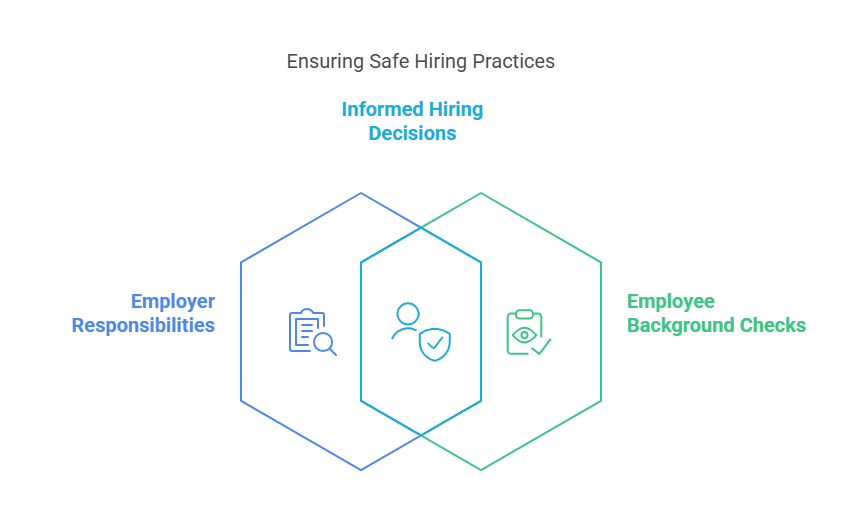
Ohio employers conduct criminal background checks to minimize risk in their hiring practices. Criminal records can reveal an individual’s history of arrests, convictions, or warrants, providing essential information on whether a potential employee poses a security threat or legal liability.
In Ohio, employers rely on criminal background checks to determine if a candidate has been involved in criminal activity that could affect their ability to perform certain job duties. For example, an individual applying for a job that requires financial trust, such as a banking position, may be subject to a criminal check to ensure that they do not have a history of financial fraud or embezzlement. Similarly, jobs that involve working with vulnerable groups, such as children or the elderly, require thorough checks to safeguard these populations from potential harm.
The increased need for criminal background checks across industries stems from employers wanting to make informed hiring decisions and to protect both their staff and customers. Without this information, an employer might unknowingly hire someone with a history of violent behavior or other risks, which can be damaging to the organization.
The Criminal Background Check Process in Ohio
In Ohio, several agencies and channels are involved in conducting criminal background checks. Each of these options varies in terms of scope, cost, and timeline. Let’s take a closer look at how background checks are conducted in Ohio and who is responsible for providing the relevant information.
- Ohio Bureau of Criminal Investigation (BCI): The BCI is the official state agency responsible for providing criminal background checks in Ohio. Employers, landlords, or individuals can request a check through the BCI to access information about criminal history at the state level. This includes arrest records, convictions, and other relevant criminal data. The BCI is the primary resource for Ohio-based background checks.
- Federal Bureau of Investigation (FBI): In some instances, especially for positions with a broader scope of security clearance or for those requiring access to sensitive information, employers may request a criminal background check from the FBI. This check provides nationwide criminal history data and is more comprehensive than a state-level check, as it includes data from all U.S. jurisdictions.
- Private Third-Party Providers: Many employers rely on third-party providers to conduct criminal background checks. These services often gather data from various sources, including public records, state and national databases, and court records. These services can be faster and provide more extensive checks, but employers must ensure that these companies are compliant with both Ohio state laws and federal regulations.
The criminal background check process in Ohio is generally straightforward. However, employers must obtain the applicant’s consent before initiating a check. Once consent is given, the requested agency or provider will begin searching public records to gather relevant data on the individual’s criminal history. The results of the background check are then shared with the employer, who can use this information to assess the candidate’s suitability for the role.
Types of Criminal Information Included in Ohio Criminal Background Checks
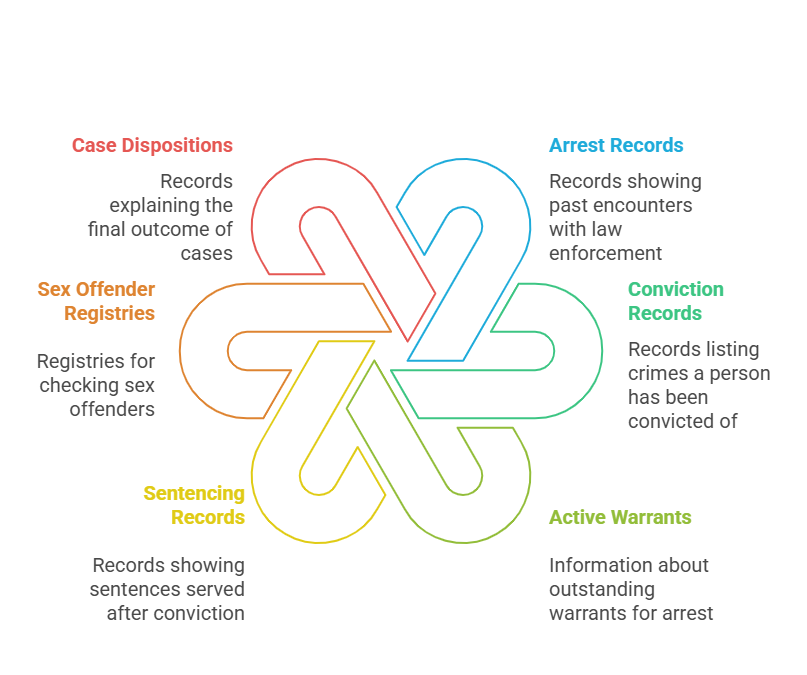
A comprehensive criminal background check in Ohio typically includes various types of criminal information that can assist employers in making their hiring decisions. These records may contain:
- Arrest Records: These records show whether a person has ever been arrested, regardless of whether they were convicted. Arrest records can be important, as they may indicate past encounters with law enforcement, even if the person was not ultimately charged with a crime.
- Conviction Records: Conviction records are perhaps the most significant aspect of a criminal background check. These records list any crimes a person has been convicted of, such as felonies and misdemeanors. Employers rely heavily on this information to evaluate whether a candidate’s past convictions could affect their performance or safety in the role.
- Active Warrants: Criminal background checks may also include information about active warrants. If an individual has an outstanding warrant for arrest, it could indicate that they are still wanted by law enforcement, which is crucial information for an employer to know before making a hiring decision.
- Sentencing Records: These records show any sentences the individual served after being convicted of a crime. For example, it may include the duration of prison time or any probationary sentences that were handed down.
- Sex Offender Registries: For certain positions that involve direct interaction with children, the elderly, or other vulnerable populations, it’s essential to check whether the candidate is listed on any sex offender registry. Employers in Ohio must be aware of these registries when hiring for these sensitive roles.
- Case Dispositions: Disposition records explain the final outcome of a criminal case. This may include whether the person was convicted, acquitted, or if the case was dismissed. This section helps employers determine the severity of the individual’s criminal history and understand the context behind the charges.
Why Employers in Ohio Rely on Criminal Background Checks
There are multiple reasons why criminal background checks are essential for employers in Ohio:
- Workplace Safety: Ensuring that employees do not pose a risk to the workplace or other employees is one of the primary reasons employers conduct criminal background checks. For example, someone with a violent criminal past might not be suitable for a job that requires close interaction with others, while a person with a history of theft might not be suitable for positions in finance or retail.
- Compliance with Industry Regulations: Certain industries in Ohio, such as healthcare, education, and finance, have strict regulations that require criminal background checks as part of the hiring process. Employers in these fields must ensure that they are complying with both state and federal requirements to avoid legal issues.
- Legal Liability Protection: Employers have a legal responsibility to ensure their workplaces are safe and secure. If an employer fails to conduct a proper criminal background check and hires someone with a violent or dangerous history, they may be held liable if an incident occurs in the workplace.
- Risk Mitigation: Criminal background checks provide employers with valuable information to mitigate risk. By identifying a candidate’s past criminal history, employers can better assess whether the individual may be a liability, reducing the chances of workplace incidents or legal troubles down the road.
- Building Trust with Customers and Clients: In some industries, such as healthcare, education, or finance, hiring employees without criminal histories can be essential in maintaining the trust of customers, clients, and the public. Clients may expect that individuals working with them or their families have been vetted and do not have a criminal background that could jeopardize their safety or well-being.
Overview of Criminal Background Check Laws in Ohio
Ohio has specific laws governing the use of criminal background checks in employment. These laws aim to protect the rights of job applicants while ensuring employers have the information necessary to make safe and informed hiring decisions.
Some key aspects of Ohio’s criminal background check laws include:
- Ban-the-Box Legislation: Ohio law prohibits employers from asking about criminal history on initial job applications, a policy referred to as “ban the box.” This law aims to give applicants with criminal records a fair chance to be considered for a position, allowing their qualifications to be evaluated before their criminal history is disclosed.
- Expungement and Sealing of Criminal Records: Ohio allows individuals to expunge or seal certain criminal records, making them inaccessible to employers during background checks. If an individual’s record is sealed, employers cannot legally consider that information when making hiring decisions.
- Fair Credit Reporting Act (FCRA): The FCRA is a federal law that regulates the use of background checks, including criminal background checks, for employment purposes. It mandates that employers obtain written consent from job applicants before running a criminal background check, and they must notify candidates if they decide not to hire them based on the results of the background check.
Process, Best Practices, and Solutions for Criminal Background Checks in Ohio
Step-by-Step Process for Conducting Criminal Background Checks in Ohio
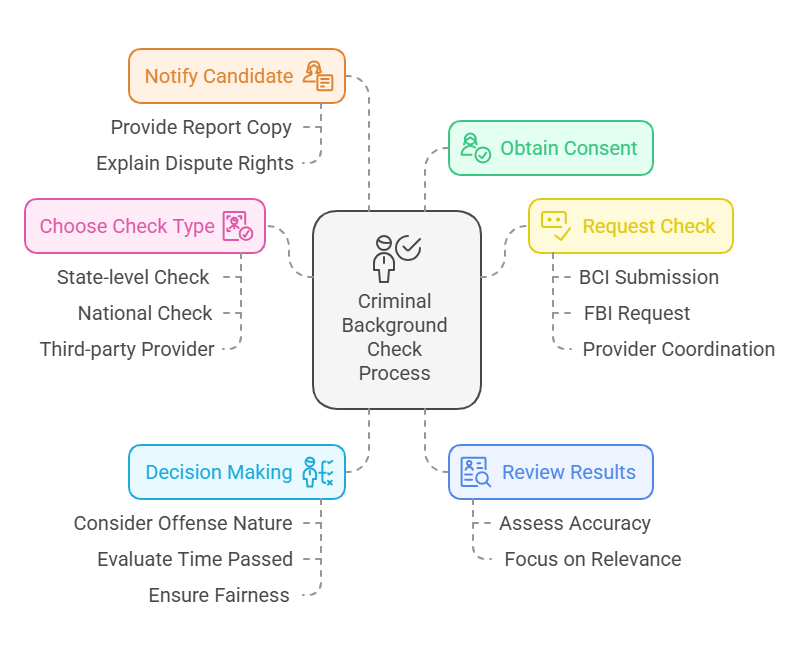
Criminal background checks are a crucial aspect of the hiring process for employers in Ohio. Conducting these checks ensures that employers have comprehensive information about a potential employee’s criminal history and can make informed decisions. Below is a detailed overview of the step-by-step process for conducting a criminal background check in Ohio:
Step 1: Obtain the Candidate’s Consent
Before conducting a criminal background check, employers must first obtain the candidate’s consent. Under both federal and state law, individuals have the right to know if their criminal background is being checked, and they must give explicit written consent. The consent form typically includes a statement explaining that the employer intends to run a background check, outlining the potential use of the results, and asking for the candidate’s agreement.
Step 2: Choose the Type of Background Check
Once consent is obtained, employers need to determine the type of background check they want to conduct. There are different levels of checks, including:
- State-level background checks: These checks are conducted through the Ohio Bureau of Criminal Investigation (BCI) and provide information about arrests, convictions, and other criminal activities within Ohio. State-level checks are often sufficient for many positions but may not include out-of-state information.
- National background checks: Employers can opt to conduct a background check that covers criminal history across the entire United States. This is done through the FBI and can provide a more comprehensive view of the candidate’s criminal history, including any records outside of Ohio.
- Third-party providers: Some employers rely on private companies that specialize in background checks. These companies often aggregate data from public records, databases, and other sources to offer a broader scope of information, sometimes including employment history, credit reports, and other checks. These services can provide more detailed background checks but must comply with federal and state laws.
Step 3: Request the Criminal Background Check
Once the type of check is determined, the employer can request the criminal background check. This can be done directly through the Ohio BCI for state-level checks or through third-party vendors for broader checks. If an FBI check is necessary, employers can submit requests via the FBI’s Criminal Justice Information Services (CJIS) division.
For Ohio background checks, the BCI provides a streamlined process that involves submitting the applicant’s fingerprints and other identifying information. If the background check is requested through a third-party provider, the service will typically require the candidate’s full name, date of birth, and other personal details.
Step 4: Review the Background Check Results
Once the criminal background check is completed, the employer will receive the results. These results will typically include details on any past arrests, convictions, warrants, and other criminal activities. It may also provide information on whether the individual is listed on a sex offender registry.
Employers must be careful when reviewing the results, as some information may be incomplete or incorrect. They should focus on relevant convictions and arrests, especially those that could impact the employee’s ability to perform the job or pose a risk to workplace safety.
Step 5: Decision Making and Action
After reviewing the criminal background check results, employers can make a decision regarding the candidate’s suitability for the job. However, it is important to note that employers should not automatically disqualify an applicant based solely on a criminal record. The nature of the offense, how long ago it occurred, and whether it is relevant to the job position should all be taken into consideration.
If the background check results lead to concerns, employers must follow up with the candidate before making a final decision. This step is necessary to comply with laws such as the Fair Credit Reporting Act (FCRA), which requires employers to provide the candidate with an opportunity to dispute any inaccurate or incomplete information before making a final decision.
Step 6: Notify the Candidate of the Decision
Once a hiring decision has been made, employers are required to notify the candidate about the outcome. If the decision is to reject the candidate based on the results of the criminal background check, the employer must provide a copy of the background check report and inform the applicant of their rights to dispute any inaccuracies.
Best Practices for Conducting Criminal Background Checks in Ohio
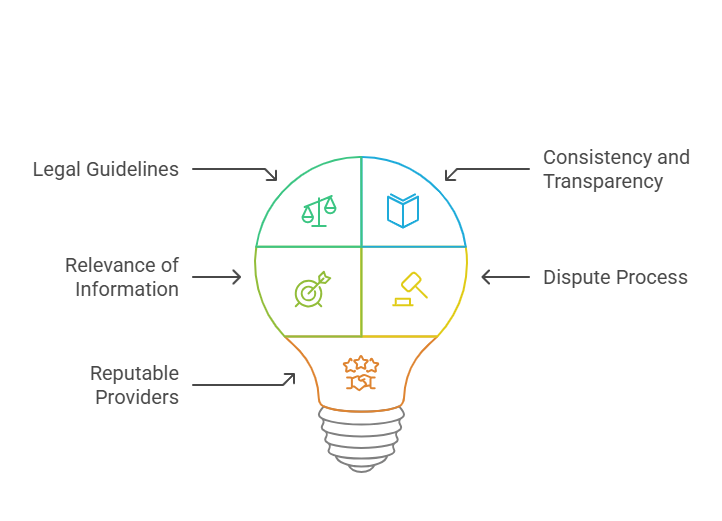
Employers in Ohio must adhere to best practices when conducting criminal background checks to ensure compliance with both federal and state laws. Below are some key best practices to follow:
1. Follow Legal Guidelines
Employers must follow both federal and state laws governing background checks, including the Fair Credit Reporting Act (FCRA) and Ohio’s Ban the Box law. Failing to comply with these laws can result in legal penalties, lawsuits, or reputational damage.
- Under the FCRA, employers must obtain written consent from the applicant before running a background check.
- The Ban the Box law prohibits employers from asking about criminal history on initial job applications. Criminal history inquiries should only be made after the employer has determined the candidate meets the qualifications for the job.
2. Be Consistent and Transparent
To ensure fairness, employers should establish a consistent policy for conducting background checks and apply it uniformly to all job applicants. This approach helps prevent discrimination and ensures that all candidates are evaluated based on the same criteria.
Transparency is also important. Candidates should be informed about the background check process and have the opportunity to explain any criminal history that may appear in the report. This ensures that employers make informed decisions and that candidates are treated fairly.
3. Focus on Relevant Information
Employers should focus on criminal convictions or charges that are relevant to the position. For example, an applicant applying for a job as a bank teller may be scrutinized for any financial-related offenses, while a candidate applying for a job in childcare may face additional scrutiny if they have a history of violence or sexual offenses.
Non-relevant information, such as minor offenses that occurred many years ago, should not automatically disqualify an applicant. Employers should assess the relevance of the criminal record in relation to the job’s responsibilities.
4. Allow Candidates to Dispute Errors
The FCRA mandates that candidates must have an opportunity to dispute any inaccuracies found in their criminal background check report. If a candidate believes the background check contains incorrect or outdated information, they should be allowed to challenge it. This ensures that only accurate information is used in making hiring decisions.
5. Use Reputable Background Check Providers
Employers should partner with reputable background check providers, such as Rapid Hire Solutions, which can help streamline the process and ensure accuracy. A reliable provider will access comprehensive databases, including both state and national records, and provide the employer with clear, accurate results. Using third-party services helps employers ensure they are not overlooking important criminal history information that could affect their decision-making.
Rapid Hire Solutions: Helping Employers in Ohio Conduct Criminal Background Checks
At Rapid Hire Solutions, we specialize in providing employers in Ohio with comprehensive, accurate, and compliant criminal background checks. Our services are designed to streamline the screening process, offering employers a hassle-free experience with fast results and thorough reports.
We understand the importance of making informed hiring decisions, and we help businesses of all sizes conduct background checks that adhere to both federal and state guidelines. Whether you need state-level checks or nationwide screenings, we ensure that you have the information you need to make safe and effective hiring choices.
Key Services Offered by Rapid Hire Solutions:
- Criminal Background Checks: We offer state and national criminal background checks that provide employers with comprehensive details about an applicant’s criminal history.
- Compliance Assistance: We help employers navigate the legal requirements surrounding background checks, including consent forms and legal notifications.
- Fast and Accurate Results: Our services ensure that employers receive accurate background check results quickly, allowing for faster decision-making.
- Affordable Pricing: We offer competitive pricing to ensure that businesses of all sizes can access affordable, reliable background check services.
By partnering with Rapid Hire Solutions, employers can confidently conduct criminal background checks, ensuring they make informed, compliant hiring decisions in Ohio.
Methods for Conducting Criminal Background Checks in Ohio
Here is a list of methods employers can use to conduct criminal background checks in Ohio:
| Method | Description | Pros | Cons |
|---|---|---|---|
| State-Level Check (BCI) | Conducted by the Ohio Bureau of Criminal Investigation (BCI) | Specific to Ohio, reliable | Limited to Ohio records only |
| Federal FBI Check | Conducted through the FBI for national criminal history | Comprehensive (nationwide coverage) | More time-consuming and expensive |
| Third-Party Providers | Private companies offering criminal background checks | Quick results, broad coverage | Quality may vary, cost varies |
| Local Court Records | Directly checking local court records | Can be very specific | Requires manual effort, time-consuming |
Legal Aspects of Criminal Background Checks in Ohio
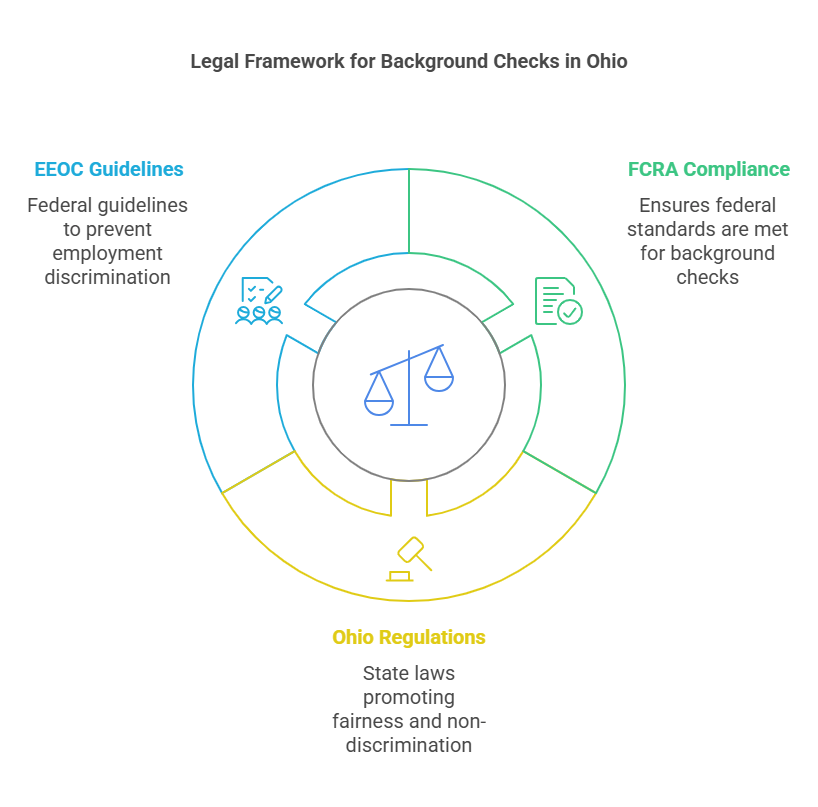
Criminal background checks in Ohio are regulated by both federal and state laws. Employers must adhere to these laws to ensure they are conducting background checks in a legally compliant manner, avoiding discrimination, and protecting both their business and their applicants’ rights.
1. The Fair Credit Reporting Act (FCRA)
The Fair Credit Reporting Act (FCRA) is a federal law that regulates how employers can use criminal background checks in the hiring process. It sets clear guidelines about how background check information can be used, who can access it, and the steps employers must take to ensure compliance.
Key aspects of the FCRA include:
- Consent: Employers must obtain written consent from applicants before conducting a criminal background check.
- Notification: If an employer intends to reject an applicant based on information found in the background check, they must notify the applicant in advance. This is known as a pre-adverse action notice.
- Dispute Process: If the applicant disputes the accuracy of the report, they must be given the chance to resolve the dispute before a final hiring decision is made.
Failing to comply with the FCRA can result in legal consequences, including lawsuits, fines, and damage to an employer’s reputation.
2. Ohio-Specific Regulations
In Ohio, employers are also subject to state-level regulations regarding criminal background checks. Ohio’s laws emphasize fairness and non-discrimination. Employers must adhere to the Ohio Civil Rights Act, which prevents discrimination based on race, color, religion, sex, or national origin when making hiring decisions based on criminal records.
Ban the Box: Ohio is one of many states that has enacted Ban the Box legislation, which prevents employers from asking about an applicant’s criminal history on the initial application. Criminal history questions should only be asked after the initial interview or when the employer determines the applicant is a serious candidate.
Sealing or Expunging Criminal Records: Ohio law allows certain criminal records to be sealed or expunged, meaning they can be removed from public records under specific conditions. Employers must be aware that they cannot use sealed or expunged records against applicants in the hiring process.
3. Equal Employment Opportunity Commission (EEOC) Guidelines
The Equal Employment Opportunity Commission (EEOC) enforces federal laws that prohibit employment discrimination. The EEOC has established guidelines for how employers should handle criminal records in employment decisions.
The EEOC’s guidelines stress that employers should assess the nature of the crime, how long ago it occurred, and whether it is relevant to the job. Employers should not automatically exclude applicants with criminal records, but instead take a case-by-case approach that is consistent and non-discriminatory.
Employers must ensure that their criminal background checks do not disproportionately affect certain groups of people, as this could violate anti-discrimination laws. It’s important to maintain fairness in evaluating criminal histories and to consider the candidate’s qualifications in relation to the position.
Frequently Asked Questions (FAQs) about Criminal Background Checks in Ohio
What types of offenses show up on a criminal background check in Ohio?
Criminal background checks in Ohio typically include felony convictions, misdemeanors, arrests, active warrants, and sex offender registry status. The information included can vary depending on whether the check is done at the state, county, or federal level. Expunged or sealed records do not show up in the background check results, per Ohio law.
How long does it take to get a criminal background check in Ohio?
The time it takes to process a criminal background check in Ohio can vary based on the method used. State-level checks through the Ohio Bureau of Criminal Investigation (BCI) typically take a few days, while FBI checks or those processed through third-party providers may take longer, depending on the complexity of the check.
Can an employer deny employment based on a criminal background check in Ohio?
Yes, an employer can deny employment based on criminal history, but only if the criminal record is relevant to the job in question. Under Ohio law and the EEOC guidelines, employers must perform a case-by-case evaluation, considering factors like the nature of the offense, its relevance to the job, and how long ago it occurred. Employers cannot automatically reject an applicant based on criminal history.
Can I dispute a criminal background check in Ohio if the information is wrong?
Yes, individuals have the right to dispute inaccuracies in their criminal background check report. Under the Fair Credit Reporting Act (FCRA), if you find an error in your criminal background check, you must notify the background check provider and the agency responsible for the data. They are obligated to investigate and correct any errors.
How does a criminal background check impact my job prospects in Ohio?
A criminal background check can affect your job prospects in Ohio, depending on the nature of the criminal record and the type of job you're applying for. Certain positions, such as those in healthcare or finance, may have stricter requirements regarding criminal history. However, under Ohio's Ban the Box law, employers cannot ask about criminal history on initial applications, giving you the opportunity to be evaluated based on your qualifications first.
Conclusion: Key Takeaways on Criminal Background Checks in Ohio
In Ohio, criminal background checks are an essential part of the hiring process, allowing employers to assess the suitability of candidates while also maintaining a safe and secure workplace. As we’ve discussed, employers must follow a set of legal guidelines, including the Fair Credit Reporting Act (FCRA), Ohio Civil Rights Act, and Ban the Box regulations, when conducting background checks.
By adhering to best practices and being mindful of Ohio-specific laws, employers can ensure that they are conducting criminal background checks in a fair, legal, and compliant manner. In addition, partnering with trusted background check providers like Rapid Hire Solutions can streamline the process, making it easier for employers to obtain accurate and timely results.
Finally, criminal background checks in Ohio must be handled with care and fairness. Employers should treat all applicants equally and be transparent about their background check policies. With the right approach, criminal background checks can help create a safer and more compliant hiring process, ultimately benefiting both employers and employees.
